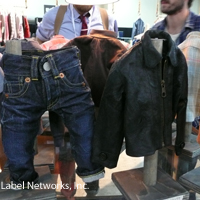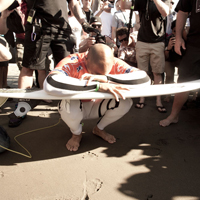
UNIQLO%uFFFDs New Collection from Jil Sander
When a retailer comes out with a 31.6% increase for last month’s sales during a time when most other retailers in fashion are still suffering, it deserves a second look. Uniqlo, the Japanese fast-fashion retailer that’s been slowly invading the United States, has tapped into several formulas that simply work in a difficult economy. And their collections are good and offered at an affordable price point.
To start, looking at the financials of Uniqlo posted October 1, 2009, their same store sales increased 31.6% compared with last year, while sales at directly managed stores increased by an incredible 40.8%.
Uniqlo accounts for this based on the fact that cool temps in Japan helped with autumn and winter sales, coupled with Japan’s new Silver Week grouping of national holidays which allowed more people time off. In addition, Uniqlo had two strong campaigns going on including Uniqlo Collection Tokyo 2009, and From Tokyo to the World.
To top it off, September marked the launch of a new spin-off for the retailer, Uniqlo Shoes including 4 women’s selections and 4 men’s selections. And now, there’s the launch of German designer Jil Sander’s collection called J which has been getting rave reviews for its edginess. This collection also marks a more upscale approach to attract a different type of buyer to Uniqlo. Interestingly, the J collection is only available at 90 stores and online -which is where they do an incredible business.
In our Uniqlo Profile Report, many of the other interesting traits of Uniqlo is that they also worked fast in creating a digital lifestyle and shopping experience for the brand overall. As we reported in April, 2008, in “Tokyo’s Top Retailers, Harajuku La Foret Shibuya 109 Get Overhauled with New Online Avatar Features, Additional Boutiques -Label Networks’ Japan Data Reveals Favorite Retail among Youth Culture Where Changes Could Capture Marketshare,” it’s taken time for top retailer malls to get into the digital arena, and things have been woefully slow for many top American retailers when it comes to digital shopping integration.
However the 2 giants such as H&M (with Second Life) and Uniqlo have achieved massive success on an enviable scale in a multitude of ways. Uniqlo, as we’ve been tracking in our Japan Youth Culture Study, ranks 3rd as the favorite store to shop in among 15-30-year-olds in Japan, and in the last year, has stretched far into the digital domain to reach the growing generation of consumers who easily expect such things from their favorite stores and brands. Like H&M, what happens with Uniqlo should be noted in terms of changes and opportunities in the market for many brands -not just The Gap -which unfortunately continues to sag under it’s own weight (see also Label Networks’ North American Youth Culture Studies 2004-2009.)
To provide a little history on the store, when we first came across Uniqlo in Harajuku several years ago when creating our first Japan Youth Culture Study, the non-descript store was clearly one of the favorite shopping destinations among Label Networks’ researchers and reporters. Jackets, hoodies, pants, T-shirts, and other items were in a variety of colors (think American Apparel) but without branded labels in a no-brand, branded way -other than being in a Uniqlo store. This isn’t to say the store was a mono-label store, but more like a non-branded fast-fashion type of store with items that were affordable like H&M and changed often.
Interesting however, Uniqlo started as a men’s shop called Men’s Shop OS before changing its name to Unique Clothing Warehouse, then Uniqlo with its first store in hipster-central Harajuku. However in our data, now Uniqlo ranks higher in preferences among females who name Uniqlo their favorite compared with males. In addition, the store captures a strong marketshare of the discerning 18-20-year-old demographic, who name the store and brand as their all-time favorite (whereas other cool stores such as United Arrows peaks among 25-30-year-olds). The store has potential among both genders in terms of marketshare and already appeals to both, but has room to grow with young menswear.
As a young man, Tadashi Yanai, who created Uniqlo, would visit Barney’s in New York City and was often influenced by the store and how they marketed themselves -not to mention the types of clothing they carried and their price points. Back in the day, Barney’s was selling basic menswear and wasn’t yet a specialty store -particularly for women as it is now. However Yanai took many clues from watching this evolution when it came to creating his own retail empire. Since the opening in 1999, Uniqlo is now up to 700 stores in Japan, plus stores in Hong Kong, China, Korea, and the United States. GQ named Yanai as one of the Man of the Year profiles and was featured on the cover of GQ Japan in January, 2008. In the article both in GQ and Theme, Yanai said he planned on being “bigger than the Gap” because he wants to strive for being number 1 -not number 3 (which to him includes also H&M). But in a wholly different way. What this means for the founder is quality at a reasonable price, style that tends to change as fast as Tokyo street-style itself, and various color selections -all on clothing that is as “non-branded” as it can get, but yet people identify with as being simply Uniqlo.
In our North American Youth Culture Study Fall 2009, with store openings in New York, LA, and San Francisco, Uniqlo is now on the radar in terms of preferred shopping locations and brands. As Theme Magazine reported about Uniqlo, the store is uniquely (no pun intended) Japanese. What got it on the map is up for question, but some say it’s the fact that they opened up in Harajuku at the same time as employing Wieden Kennedy to create an ad campaign for them. With only basic fleece sweatshirts that came in 24 different colors and cost around the equivalent of $10USD, the campaign centered on individual stories of various Japanese people talking about their personal lives -which is similar to their current digital campaign. In a society where conformity rules, but “group individualism” thrives, it’s been a big hit.
For more information on Uniqlo from Label Networks, do a key-word search “Uniqlo” or email us about our Premium and North American Youth Culture Studies at info@labelnetworks.com; (323) 630-4000.


